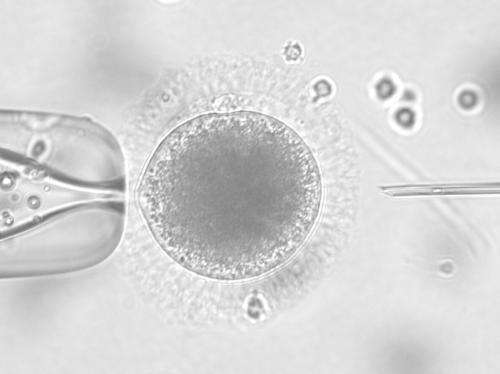Frozen semen from lions can produce embryos

Scientists from Berlin successfully produced embryos from African lions via assisted reproduction. What is genuinely new is the fact that they used immature eggs that were retrieved from African lionesses. After artificial maturation these eggs were injected with lions' sperm, previously stored in a cryobank. To surprise of the scientists from the Leibniz Institute for Zoo and Wildlife Research (IZW) the development of the lion embryos was retarded in comparison to similar embryos from domestic cats.
The reproduction biologists of the IZW report about their success in in vitro maturation and fertilization by sperm injection in African lions in the current issue of the scientific magazine "Theriogenology".
Assisted reproductive technologies (ARTs) are becoming increasingly important for the breeding of endangered species. The establishedgenome resource banks allow the integration of cryopreserved genes in existing populations regardless of time and space.
"Genome resource banks can help to solve various problems in captive breeding programmes", says Jennifer Zahmel from the IZW. Currently individual animals have to be transported for blood refreshment. Shipping embryos or just sperm cells would also reduce a possible risk of disease transmission between Zoos. Furthermore the methods of assisted reproduction are designated to link conservation efforts in the original habitat (in-situ) and with captive breeding programs (ex-situ).
In any cases, the successful use of genome resource banks requires the adaptation of assisted reproductive techniques to the species specific requirements. This includes the retrieval of gametes, culture, and cryopreservation as well as artificial insemination and embryo transfer. "These reproductive techniques are successfully applied in medical science and livestock farming a. However, a comprehensive basic research is needed, owed by considerable differences in anatomy and physiology in many endangered mammals", explains Katarina Jewgenow, head of reproduction biology department of IZW.
Feline carnivores benefit from the development of reproductive techniques in domestic cats. Until now, diverse ARTs have been developed for domestic cats. Now the challenge is to make this knowledge available for endangered felids. "The in-vitro produced embryos of the African lions proved, that the methods developed for domestic cats can also be applied to lions, even though the variations developmental speed of the embryos indicate some fascinating differences between these species", says Lorena Fernandez-Gonzalez.
Overall 68 immature oocytes, retrieved after eight-hour transportation, were cultivated in-vitro for one and a half days in a special medium. Over one third of the eggs matured and was fertilized via intracytoplasmic sperm injection (ICSI). For this, a single lion sperm is injected directly into an egg with a micro-needle. The frozen/thawed sperm used in this study was from a lion of an European zoo, which died in 2012. Even though the sperm cells exhibited a limited viability after thawing, the fertilization of a few oocytes was successful. This was verified by embryo cleavage, although the advanced blastocyst stage was achieved as late as after nine days culture. In domestic cats blastocysts can be observed after seven days already. The reasons for the slower developmental speed remain a mystery. It could be caused by the retrieval of the gametes postmortem, the prolonged transportation of the ovaries or even simply be a species-specific feature.
"The successful application of this method of oocytes maturation is of particular importance for species conservation. The retrieval of fertile eggs from animals in the wild is only possible to a limited extend. However, without eggs the assisted reproduction is impossible", comments Jewgenow.
More information: Fernandez-Gonzalez L, Hribal R, Stagegaard J, Zahmel J, Jewgenow K (2015): "Production of lion (Panthera leo) blastocysts after in vitro maturation and ICSI." Theriogenology dx.doi.org/10.1016/j.theriogenology.2014.11.037
Provided by Forschungsverbund Berlin e.V. (FVB)


















